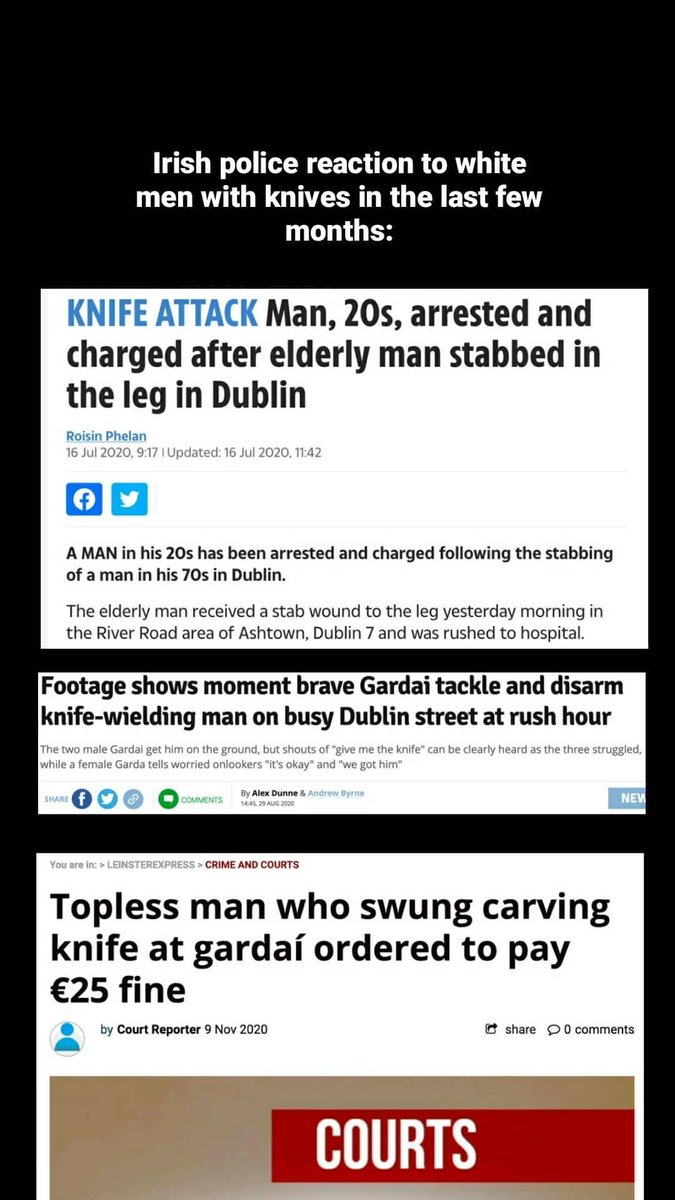Today Gardaí pepper sprayed, tasered and shot dead a young Black man with mental health issues. There will be an ombudsman inquiry, as there always is in the case of a death at the hands of Gardai. Some thoughts...
There have been many such deaths at the hands of police in the UK over the years. So many of them involve mental health issues. The @IRR_News has recorded many of those.
Police are rarely disciplined for the use of lethal force in the case of mental health issues, because the decision is based on the balance of threat versus force.
Butp police are not mental health specialists, and they make a judgement on the perceived safety of officers. Those judgements on threat are often based in biases that perceive ethnic minorities, particularly people of African descent, as more aggressive.
Policing of Black communities worldwide suffers from this bias problem, as do investigations into lethal force by police.
Police services rarely acknowledge these biases, nor do those bodies that investigate them.
Police services rarely acknowledge these biases, nor do those bodies that investigate them.
No criminal offence in Ireland carries the death penalty, yet lethal force was used today against a single young suspect, in front of tens of Gardai, armed and unarmed.
The forthcoming inquiry into the death must take seriously the questions of bias which are raised by this incident, and whether Gardai acted appropriately - in light of the high risk of bias in favour of ethal force - in their findings.
Above all, we must remember that a community is grieving and fearful for their children tonight. An Garda Síochána must go above and beyond to demonstrate that they can be trusted to acknowledge and address bias, and police our communities fairly and transparently.
In the year of the death of George Floyd in the US, and #BlackLivesMatter  discussions across the globe, it is imperative that we have an open discussion about this incident. To do otherwise risks creating deep seams of distrust here as in other countries.
discussions across the globe, it is imperative that we have an open discussion about this incident. To do otherwise risks creating deep seams of distrust here as in other countries.
 discussions across the globe, it is imperative that we have an open discussion about this incident. To do otherwise risks creating deep seams of distrust here as in other countries.
discussions across the globe, it is imperative that we have an open discussion about this incident. To do otherwise risks creating deep seams of distrust here as in other countries.
Response to a few questions :
1. The intersection of race and mental health issues here is key. Racial stereotypes play into judgements of unpredictable behaviour in cases like these investigated elsewhere.
Racism is not one potential aspect.
1. The intersection of race and mental health issues here is key. Racial stereotypes play into judgements of unpredictable behaviour in cases like these investigated elsewhere.
Racism is not one potential aspect.
2. Cases of lethal force tend to be more reflective of institutional trends and regional attitudes than psychology or behaviour of individual police officers. That should be taken into account here.
3. The focus here must be on building trust in policing, and in community, and accountability of organisations is part of that. Police officers act FOR the organisation when they use lethal violence. AGS must be prepared to be open.
4. This is also about preserving all our rights. Every person suspected of crime has legal right to arrest, investigation and fair trial. Lethal force removes all those rights on a subjective assessment by police who are not mental health specialists, prosecutors, judge or jury.
5. A lot of people are asking questions tonight about this case. My comments are an attempt to answer some of those, and aimed at the forthcoming inquiry.
Finality, his name is George Nkencho. He was a young man who was well known and loved, and popular in Hartstown. His community is grieving and fearful tonight. Their grief is heartbreaking. We stand with them. #GeorgeNkencho
Many of the community are addressing this issue online - you can support them with #JusticeforGeorgeNkencho

 Read on Twitter
Read on Twitter


